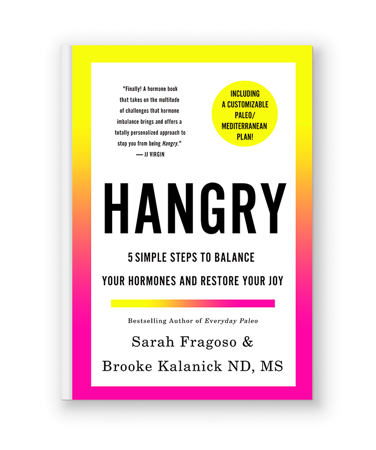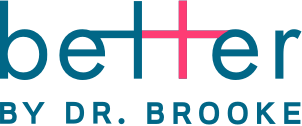
The problem is that women often have some aspects of the condition but not others, making our current classification, treatment and nutrition recommendations confusing at best and frustrating for many women with PCOS – or those thinking they may have it.
Hormonal disruptions including elevated LH (luteinizing hormone), elevated testosterone (or other androgens like androstenedione, DHT or DHEA-S), elevated prolactin, abnormal cortisol levels, low progesterone, low estrogen, estrogen dominance, and insulin resistance (ranging from mild to severe) can all be present.
Women may have acne, unwanted hair growth and trouble ovulating and struggle with fertility. And some women have multiple, small, dysfunctional cysts on their ovaries.
Some women have all of these findings, others have only a few. Some women get a period, others do not. Some women struggle to get pregnant, others have little issue here. Some women have beautiful skin, others regularly deal with breakouts. Some are losing hair on their head and having to tweeze, wax, thread, laser or shave rogue hairs elsewhere on their body. And some women are overweight or struggle to lose body fat, while others do not.
Because there are so many variances in this condition, you can see where this has led to a lot of trouble with “PCOS nutrition” that is one size fits all.
Order Hangry right now!
If you’ve ever felt like a Hangry B*tch and are ready to balance your hormones and restore your joy in just 5 simple steps then Hangry is for you!
GET YOUR COPY NOW
Do You Look Like You Have Insulin Resistance?
A hallmark of PCOS is blood sugar control and insulin resistance, but with varying severity. Among the biggest mistakes I see made with PCOS women and nutrition is that unless they “look the part”, meaning they are struggling with weight loss, have a mustache, breakouts and no period, then they do not have insulin resistance or blood sugar problems.
It’s so important to not look at a woman as many docs do and say, “Well you just don’t look like you have PCOS so we’re not testing or discussing this any further” or a personal trainer saying, “What do you mean you don’t tolerate all these carbs I’m telling you to eat? You don’t look like you can possibly have insulin resistance”.
You can’t tell someone’s insulin response by looking at them.
Just like someone very overweight can have normal hormone and insulin responses upon testing, someone without a lot of excess weight can have insulin resistance. And most women have more hormones than just insulin out of whack making “what to eat if you have PCOS” even more confusing. Because of this our PCOS nutrition advice has to be more nuanced. It’s not as simple as “just go low carb” or “carbs are good, eat them all.”
(Psst….Wondering what hormone issues you have? Take my quiz.)

The Two PCOS Body Types
PCOS body types are often called: the heavy type and lean type. I absolutely hate this because we tend to think of heavy as bad and lean as good, I don’t think we need to further that idea as women have enough body image issues to wrap our heads around.
Again, at the root of PCOS is some degree of insulin resistance
But even that is not black and white. Insulin resistance happens on a spectrum, varying from woman to woman and even from tissue to tissue within the same woman.
This, in my mind, is the best way to categorize the various body types with PCOS:
- Muscle resistant (put on fat easily, AKA heavy type)
- Fat resistant (don’t put on fat as easy, AKA lean type)
As it helps you direct what you can do about it as well as understand why all women with PCOS don’t have the same body type.
Where Are You More Insulin Resistant?
Think of insulin sensitivity as a spectrum: more resistant and more sensitive or responsive. When a tissue is sensitive it heeds insulin signaling well and nutrients (i.e. glucose, vitamins) get in. When it’s resistant, it takes a lot more insulin to get that tissue to respond to insulin and finally let nutrients in. The tissues we’re primarily talking about in the case of PCOS are the ovaries, liver, muscle and fat.
A woman can be sensitive at one tissue but not at another – save the ovaries, they remain insulin sensitive which is why PCOS shows up as female hormone imbalances almost across the board whereas other symptoms can vary.
This tissue-specific insulin resistance is where the two body types we see in PCOS come into play:
- some women with PCOS have an easy time gaining weight/hard time losing it
- and others don’t find themselves overweight per se but even they will say losing those last 5-10 pounds is incredibly difficult.
Here’s the difference between the two body types with PCOS:
1. When your fat cells are resistant, they don’t respond as quickly to insulin’s message to store up, so these women gain body fat less easily. And because their muscles take in nutrients and glucose quickly, they often deal with low blood sugar issues as well as insulin resistance issues (higher blood sugars).
These women are typically called the “lean type”, I call them the fat resistant (FR) type. They don’t put on fat as easily as the other type and struggle more with lower energy and blood sugar dips.

Now, with what’s called the “heavy type” or what I call the muscle resistant (MR) type:
2. Their muscle cells are resistant to insulin, they don’t take in nutrients as quickly and more is stored in body fat which is more sensitive. These women tend to suffer more with fatigue and exercise intolerance as well as increased body fat. They also tolerate carbs better post exercise when the muscles are more insulin sensitive thanks to GLUT4 transporters (stimulated by exercise) that take glucose into the muscle without needing insulin.
Order Hangry right now!
If you’ve ever felt like a Hangry B*tch and are ready to balance your hormones and restore your joy in just 5 simple steps then Hangry is for you!
GET YOUR COPY NOW
And it’s not just PCOS…..
And of course it gets a bit more complicated as the above dynamic can change in time and of course other hormones such as cortisol and thyroid are often in the mix. When is it ever as simple as one hormone out of balance? Not for us ladies, not hardly ever.
Cortisol and adrenal health come in to play with both types.
Often the muscle resistant/fat sensitive, or MR type women deal with high cortisol problems such as inflammation, difficulty falling asleep, anxiety, etc. The fat resistant/muscle sensitive or FR women often have trouble with low cortisol and deal with increased sugar cravings, fatigue between meals and difficulty staying asleep. They also will not do well with a very low carb plan or a carbs-at-one-meal-only type plan (although they still have to be more mindful that your average girl) whereas the MR women will do better low carb overall, carbs post workout or carbs just at dinner.
Thyroid issues are particularly interesting with PCOS as they may be the cause or result of some manifestations of PCOS.
In fact, some cystic ovaries resolve completely once thyroid hormone levels are restored to proper ranges.
And I am fond of saying that Hashimoto’s (autoimmune hypothyroidism) and PCOS are best friends since they so frequently show up together in the same woman.
In fact, women with PCOS are 3 times more likely to develop Hashimoto’s. There are a couple of hypothesis on the table for why this is and one is that some forms of PCOS appear to be autoimmune in origin. Yet another reason may be the oxidative stress triggered by elevated blood glucose can increase tissue destruction and trigger autoimmunity by depleting your main anti-oxidant system, glutathione.
As you can see there is not only more than one manifestation of PCOS but there are also multiple causes. Is it any wonder why much PCOS advice leaves many women confused and frustrated?
Now that you understand what type of PCOS you have, you can do two super cool things:
- Find out how you should eat for your type
- And how to exercise for your type.

More on what to eat and for how to exercise for PCOS or any hormonal issue grab my – How To Exercise For Hormone Haywire here.
In this program you’ll learn how to prioritize multiple hormone issues to look and feel your best.
Interested in tackling your PCOS beyond the pill and Metformin? – Contact me today
